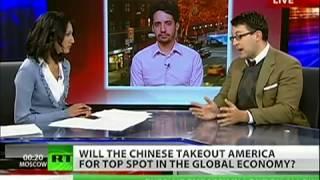
China & India - should Americans be afraid (RT)
[Background: Only 1 in 5 Americans believe the US economy is the world's strongest, while half the people polled say that China's economy is in fact the strongest. Many people believe that competition from China will negatively impact their lives.]
**Note to viewers: There is obviously a lot of hate on the subject of China and India here on YouTube. This video is mostly to do with China. However India is increasingly becoming important too. For the discussion on India please skip to 7:21**
_________________________________________________
J.P. Friere, Associate Commentary Editor, Washington Examiner
"China is actually worse in stratification. Look at the Chinese peasants. That's a consequence of not enabling people to actually create wealth. In America you are allowed to start a small business or to start some venture to create capital and that's good."
Joseph Weisenthal, Deputy Editor, Business Insider --
"I don't think we should be worried about it. There are effects on commodities and the search for oil which will certainly have an impact on our economy but I don't think it should be a worry"
[On China's rising power, globalization & wage threats for Americans]
J.P. Friere -
"Americans' quality of life has increased because we've had historically such a great economy that we could leverage to that, we could get trade agreements with countries like China. People have benefitted from that. If you ever go to a store that sells goods that are manufactured in other countries people are able to get them cheaper.
Now does that mean it might hurt our manufacturing? It actually could but the way you fix that is that you allow manufacturing to rise in this country. We need universities to turn out people that create stuff".
[Should the US focus on improving education and skills?]
"It would appear that a lot of our population for whatever reason isn't fit to go into a 4-year school or work in an office. Yet on the lower end of job opportunities we are not thinking about what we could do to become more competitive, reducing our own costs. We should reform the bureaucratic aspects that are hampering manufacturing, labour laws or environment laws. So we should actually think about how to open up and make more competitive some of those lower end industries. Not because making stuff per se is the route to prosperity but because we have a large chunk of the population that would be more suited for."
[The US lags behind in primary and secondary education]
"That is huge and I do not know what the Chinese model would be. But we would want one that embraces our sort of cultural character which is more school choice, more charter schools...things that enable people that if they have an interest early on."
[On jobs being sent overseas]
"Knowledge-based has been outsourced. But I don't think anybody really knows."
[On India -- India is a country that Americans think are stealing their jobs...but there is a growing middle-class there to sell them our products. They want a protectionist model for jobs in the United States?]
"There is this going the easy route idea. If we just tax foreign companies or reduce imports than naturally the jobs will spring up in the United States. To me that's a short-cut. Before we get that drastic there are things we do to become more competitive such as eliminating regulation, the tax code could be simplified....so before we go down this trade war idea [!] there are a lot of simple things we could do to improve our economy just getting on an even playing field with our own regulations."
**Note to viewers: There is obviously a lot of hate on the subject of China and India here on YouTube. This video is mostly to do with China. However India is increasingly becoming important too. For the discussion on India please skip to 7:21**
_________________________________________________
J.P. Friere, Associate Commentary Editor, Washington Examiner
"China is actually worse in stratification. Look at the Chinese peasants. That's a consequence of not enabling people to actually create wealth. In America you are allowed to start a small business or to start some venture to create capital and that's good."
Joseph Weisenthal, Deputy Editor, Business Insider --
"I don't think we should be worried about it. There are effects on commodities and the search for oil which will certainly have an impact on our economy but I don't think it should be a worry"
[On China's rising power, globalization & wage threats for Americans]
J.P. Friere -
"Americans' quality of life has increased because we've had historically such a great economy that we could leverage to that, we could get trade agreements with countries like China. People have benefitted from that. If you ever go to a store that sells goods that are manufactured in other countries people are able to get them cheaper.
Now does that mean it might hurt our manufacturing? It actually could but the way you fix that is that you allow manufacturing to rise in this country. We need universities to turn out people that create stuff".
[Should the US focus on improving education and skills?]
"It would appear that a lot of our population for whatever reason isn't fit to go into a 4-year school or work in an office. Yet on the lower end of job opportunities we are not thinking about what we could do to become more competitive, reducing our own costs. We should reform the bureaucratic aspects that are hampering manufacturing, labour laws or environment laws. So we should actually think about how to open up and make more competitive some of those lower end industries. Not because making stuff per se is the route to prosperity but because we have a large chunk of the population that would be more suited for."
[The US lags behind in primary and secondary education]
"That is huge and I do not know what the Chinese model would be. But we would want one that embraces our sort of cultural character which is more school choice, more charter schools...things that enable people that if they have an interest early on."
[On jobs being sent overseas]
"Knowledge-based has been outsourced. But I don't think anybody really knows."
[On India -- India is a country that Americans think are stealing their jobs...but there is a growing middle-class there to sell them our products. They want a protectionist model for jobs in the United States?]
"There is this going the easy route idea. If we just tax foreign companies or reduce imports than naturally the jobs will spring up in the United States. To me that's a short-cut. Before we get that drastic there are things we do to become more competitive such as eliminating regulation, the tax code could be simplified....so before we go down this trade war idea [!] there are a lot of simple things we could do to improve our economy just getting on an even playing field with our own regulations."
Комментарии:
China & India - should Americans be afraid (RT)
gmshadowtraders
Armed Robbers Attack Landlady Wahal compound with Johnbosco
Mc DaSaint Comedy
Everybody Makes Mistakes - There's More Get Along Monsters on the Learning Videos Channel
Harmony Square - Educational Videos & Activities
What Happened to Campagnolo?
Bicycling
FC BARCELONA 3 - 0 CA OSASUNA I HIGHLIGHTS LALIGA EA SPORTS
LALIGA EA SPORTS
Integria Symposium 2020 - Professor Kerry Bone
Integria Healthcare
(NEW EFFECT) Are You Sure 20th Century Fox Logo 1994 Is In G-Major 7 (Instructions in description)
John Gabriel Milk Saints / JGMS
The Beast Speedboat Thrill Ride | Roar to the Statue of Liberty at Maximum Speed!
Circle Line Sightseeing Cruises
Best way to repair your credit
MG The Mortgage Guy


























